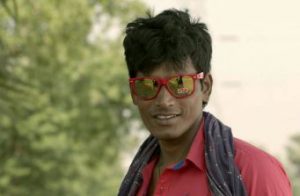By Samhati Mohapatra: From spouting emotionally-charged dialogues on his college’s drama stage to walking the red carpet at international film festivals, Jajpur-born actor Devesh Ranjan has charted a long journey to fame.
The actor was invited to the prestigious International Film Festival of India (IFFI) in Goa, where his recent film ‘Bhor’ was screened on November 22. The film, directed by Kamakhya Narayan Singh is one of the two Hindi Feature Films from India in the Indian Panorama category of the festival, the other being Shoojit Sarkar’s ‘October’. This is the first official premiere of the film which would hit the theaters next year after doing the rounds in international film festivals.
Devesh was recently seen alongside Tisca Chopra, Adil Hussain and Rashika Duggal, in the award-winning short film ‘Chutney’.
In 2013, the actor received critical acclaim on international platforms (and a special mention by filmmakers Kim Ki-Duk and Im Kwon Taek at BUSAN International Film Festival) for his performance in Khyentse Norbu’s film ‘Vara: A Blessing’.
Born in Jarada village of Jajpur district, Devesh, after futile efforts in trying his luck in Odia films, moved to Delhi in 1996 to pursue a course in company secretary. The city introduced him to theatre. “Here, I came in close contact with theatre gurus like Dilip Shankar, Robin Das, MK Sharma and BV Karanth who taught me the finer details of acting,” he says.
Armed with a four-year experience in theatre and a degree in acting from Mandi School of Drama, Himachal Pradesh, Devesh packed his bags for Mumbai, to try his luck in Bollywood.
But luck wasn’t on his side for a long time, until it finally knocked on his doors, when Devesh bagged the role of Shyam in Khyentse Norbu’s film ‘Vara: A Blessing’ in 2013. The film was released in 10 countries worldwide and was the opening film in South Korea’s famed BUSAN International Film Festival. It was the first time the South Korean festival opened with a film that was not a Korean or a Chinese film. It is also the first time in history when the festival opened by felicitating two Indian actors (Devesh Ranjan and Shahana Goswami).
If Vara was a blessing, Bhor is a new beginning for the actor. The Hindi feature film set in the midst of the Musahar (rat-eating) tribe of Bihar spins the tale of Budhni, a gritty woman who fights against her community to ascertain the right of education for girls and put an end to open defecation. Devesh plays Sugan, Budhni’s husband who defies all laws of the community to support her.
A firm believer in realistic cinema and method acting, Devesh says playing Sugan was demanding. “Sugan is a layered character. He is uneducated, yet highly progressive in his thoughts. He is a ‘rangeela’ character, a romantic at heart with comic touches to his character, who would ape fashion of the city to woo his lady love, but at the same time is mature enough to understand the politics of the village,” Devesh says.
To understand the community and Sugan’s character, Devesh lived with the Musahar tribes of Pengri in Bihar for two months. “I don’t believe in acting out a character. I believe in being that character. To understand the circumstances that shape Sugan’s personality I had to know the community, their food habits, their quirks, challenges and simplicity,” Devesh says.
Does n’t playing a character on such an intense level, affect him? “Yes, it used to. But with time, you get a grip over your emotions and learn to walk in and out of your character with ease. I remember crying for hours, after an emotional shot for ‘Vara’. It took me some time to regain my composure. That wouldn’t happen today.”
n’t playing a character on such an intense level, affect him? “Yes, it used to. But with time, you get a grip over your emotions and learn to walk in and out of your character with ease. I remember crying for hours, after an emotional shot for ‘Vara’. It took me some time to regain my composure. That wouldn’t happen today.”
In his spare time, Devesh works as an assistant to casting director Dilip Shankar known for films like Angry Indian Goddesses and Monsoon Wedding.
Even though the advent of indie films, web releases, and lenient censoring have improved the quality of Indian films, Devesh feels filmmakers need to up their game to be on the map of world cinema. “A few Indian films are getting international acclaim. But we need to make more realistic films. Most importantly we need an audience who can understand the metaphor and the psychological interpretations of such films. I know it sounds far-fetched, but it will happen soon.”
The same logic applies to the current Odia film industry, often criticized for copying south Indian cinema. Calling the 1970s and 1980s the golden period of Odia films, Devesh says the industry has competent directors like Himanshu Khatua who need support to make realistic cinema.
For actors from the state aspiring to make it big in the international platform, Devesh says there’s hope. “If they have the opportunity, they should join a drama school where they will have access to a library, films, and teachers who can help them hone their skills. Most importantly, they should believe in themselves and never get bogged down with rejections. At times you will need the right recommendations and there will be challenges in every step. But you will have to prove it to them that you are the best.”

